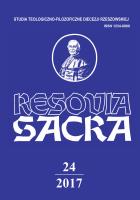POLISEMANTYCZNOŚĆ SFORMUŁOWANIA ''PŁOMIEŃ OGNIA'' NA KARTACH BIBLII I JEGO ZASTOSOWANIE JAKO ELEMENTU KOMPARATYWNEGO W OPISIE BOGA
POLYSEMANTIC PHRASE ''FLAME OF FIRE'' IN THE BIBLE AND ITS USING AS COMPARATIVE ELEMENT FOR DESCRIPTION OF GOD
Author(s): Joanna NowińskaSubject(s): Biblical studies
Published by: Instytut Teologiczno-Pastoralny im. św. Józefa Sebastiana Pelczara w Rzeszowie
Keywords: flame of fire; God; human; power; love
Summary/Abstract: Biblical authors create a language of metaphor and description on the basis of everyday life’s observation. So a lot of them are polysemantic – according to variety of vitality forms in our world. One of such example is the phrase flame of fire, used in the Greek Bible 18 times (and 2 more in Hebrew Bible). It’s a comparative element in God’s description – not only His power, independence, sovereignty but also His love and care. Biblical authors use this comparison also because of the sensual aspect of that. Very often situations are like flame of fire: something seems to be dangerous or destructive but it’s only the first impression – next it changes into experience of freedom and joy. Jesus’ eyes in the Book of Revelation are like flame of fire - because He is clear, knows us completely, dislike false and wanted people to be dynamic and apply God’s word in every – not only few – situations of life.
Journal: Resovia Sacra. Studia Teologiczno-Filozoficzne Diecezji Rzeszowskiej
- Issue Year: 2017
- Issue No: 24
- Page Range: 361-374
- Page Count: 14
- Language: Polish

